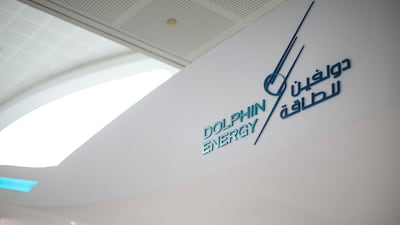Dolphin Energy, the joint venture company that owns the pipeline carrying Qatari natural gas to the UAE and Oman, has been downgraded by debt rating agency Moody's Investors Service.
In making the unusual move, Moody's cited the ongoing dispute between Qatar and several of its Arabian Gulf neighbours, including the UAE, and the effect it might have on Abu Dhabi's commitment to the project, as the reason for cutting the company's rating one notch, to A2 from A1.
The rating agency said it expects the dispute "will erode inter-governmental cooperation between Qatar and the UAE [and] over time, this will, to an extent, decrease the strategic importance of the project to the government of Abu Dhabi and the likelihood of support, should it become necessary, from Dolphin Energy's 51 per cent owner, Mubadala Development Company."
Mubadala, which has changed its name to Mubadala Investment Company following its merger in May with International Petroleum Investment Company, is the government's US$125 billion strategic fund, about a third of which is in international energy investments.The remaining Dolphin stake is split equally between Occidental Petroleum and Total.
Mubadala declined to comment on the downgrade.
It is rare for companies that enjoy full support from the Abu Dhabi or other highly-rated regional governments to be downgraded by the main credit rating agencies, even in cases where the company's finances have deteriorated to "junk bond" levels. In those cases, the agencies typically publish "shadow" ratings that reflect their actual finances, while leaving the actual rating high on the assumption of full government backing.
The UAE, whose gas demand has been growing at about 6 per cent a year, has been diversifying its sources of gas, including developing the Shah gasfield in the Western Region, which now supplies about 10 per cent of consumption. Dusup, which operates a floating storage and regasification unit (FRSU) at Dubai’s Jebel Ali port, last September upgraded its LNG capability with a new, larger FRSU chartered from Excelerate Energy, based in Woodlands, Texas. Excelerate also last August chartered to Abu Dhabi its first FSRU, which is based at the refinery town of Ruwais in the Western Region.
Abu Dhabi National Oil Company said last month that it is considering a $20bn project that would further boost sour gas output from offshore fields.
Moody's noted that Dolphin's finances are strong, and that the gas flow via Dolphin has been uninterrupted so far, even while other connections between the two countries have been hit by the closure of all ports, airfields and other trading links to Qatar traffic. Moody's goes onto say, however, that "in the current geopolitical environment, if the dispute further escalates, the risk of a gas supply disruption initiated by Qatar is higher than previously assessed. The impact on Dolphin Energy's debt service capacity following a supply disruption could be very severe."
Any supply disruption would result in a "multi-notch" downgrade, and Moody's said it didn't expect any developments that would lead to an upgrade.
Moody's analyst, Tomas O'Loughlin, wasn't available for further comment.
The decade-old Dolphin Project brings in 2 billion cubic feet a day (cfd) of gas, minus about 200 million cfd transited onward to Oman, accounting for nearly a quarter of UAE consumption last year. Dolphin’s three original customers are the Abu Dhabi Water & Electricity Company, Dubai Supply Authority (Dusup) and Oman Oil Co. Last October, an agreement to supply an unspecified additional amount of gas via Dolphin to Sharjah Electricity and Water Authority and Ras Al Khaimah was also put in place.
Qatar is the world’s dominant LNG exporter, according to WoodMac, exporting 78 million tonnes last year, or nearly 30 per cent of global supply, with about two-thirds going to Asia. Last week, the sheikhdom said it plans to increase its LNG exports by another 30 per cent, to 100 million tonnes a year.

